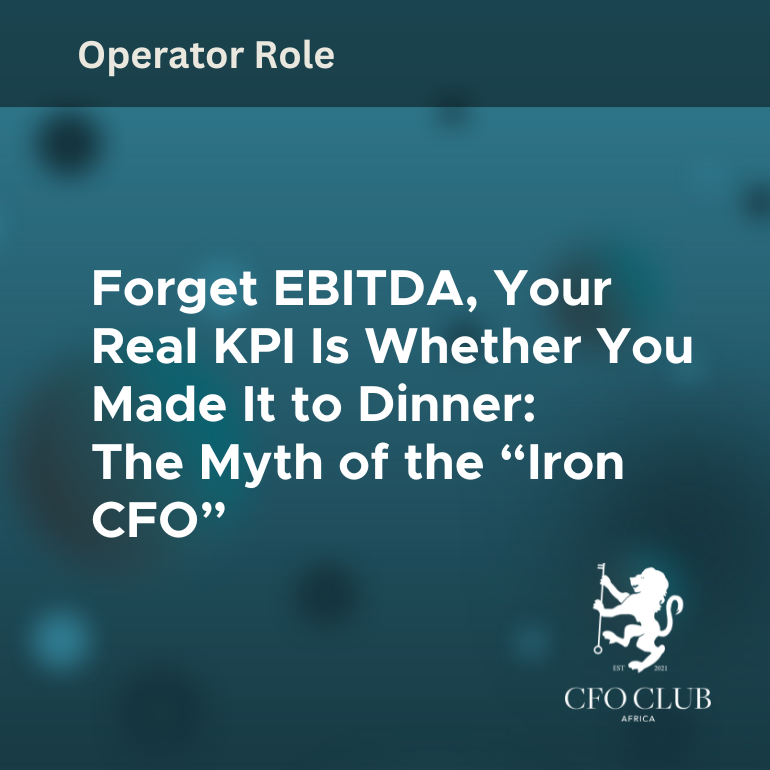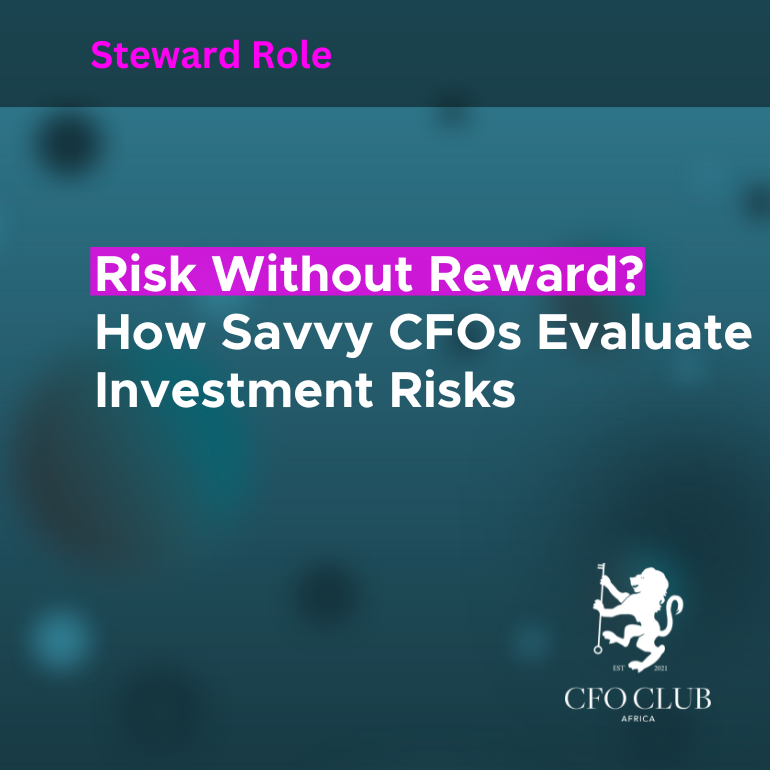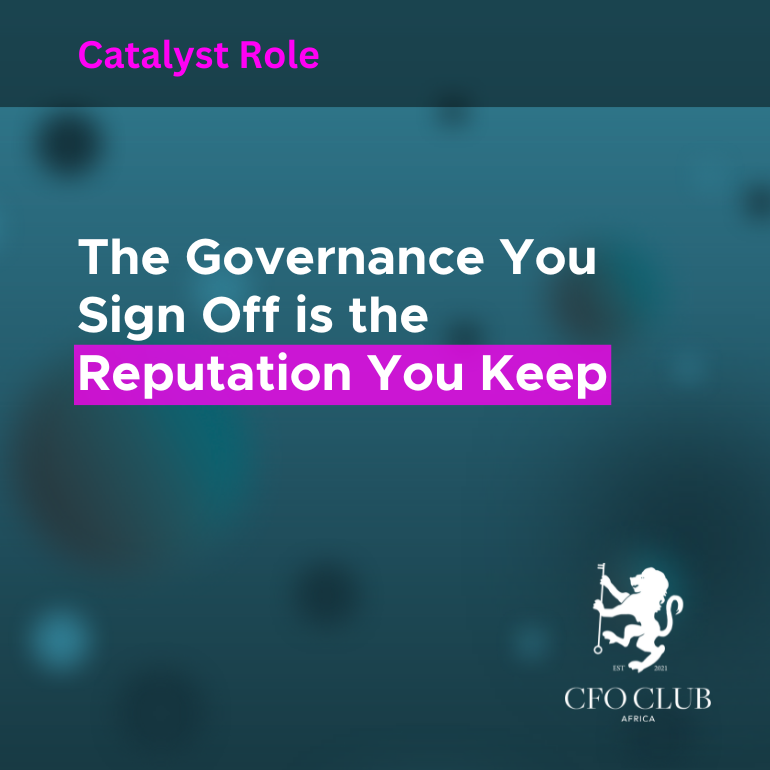Forget EBITDA, Your Real KPI Is Whether You Made It to Dinner: The Myth of the “Iron CFO”
Let’s get this out of the way: CFOs are not robots. We like to think we are, crunching numbers at midnight, surviving on coffee strong enough to dissolve a spoon, keeping companies afloat while everyone else dreams about beach holidays. But behind every “iron CFO” lies a very human body and mind, both of which, inconveniently, require regular maintenance.
The truth? No matter how sharp your financial models are, if your mind is fried and your body is running on fumes, you are not steering the business. You are barely steering yourself. That is why fitness, family, and finance are not three separate worlds but one interconnected system. Ignore one, and the others wobble.
A Harvard Business Review study found that executives who prioritise physical and mental wellbeing are 23% more effective at decision-making under stress. Twenty-three percent! That is the difference between calling a brilliant strategic pivot and greenlighting another doomed ERP upgrade because you had not slept in three days.
Why Mental Strength Is the CFO’s Real Superpower
Technical expertise? Expected. Strategic foresight? A given. But the hidden variable that separates good CFOs from great ones is mental strength, the ability to stay calm when forecasts wobble, cash flow shrinks, and the CEO suddenly discovers “blockchain” at a conference.
Mental strength is not about being unflappable like some Zen monk in the middle of a budget meeting. It is about building resilience in the same way we build balance sheets: through discipline, diversification, and constant adjustment.
Consider this: the World Health Organization estimates that stress costs the global economy $1 trillion per year in lost productivity. If you, as CFO, can manage your stress better, you are literally contributing to the bottom line. Suddenly, that early-morning run looks like an ROI-positive decision.
The CFO Gym Routine (No, Not What You Think)
Now, when we say “fitness,” most CFOs imagine Lycra, overpriced gym memberships, and the kind of protein shakes that taste like sadness. But let us be honest: CFOs do not need six-packs, unless we are talking about a six-pack of mineral water for those never-ending board meetings.
What CFOs do need is consistency. Research from the American Psychological Association shows that 20 minutes of moderate exercise, three times a week, can reduce stress levels by up to 40 percent. That is not about sculpting abs, it is about avoiding that blank stare when someone in EXCO asks you a question and your brain temporarily leaves the building.
Think of it this way: budgeting is painful but necessary. So is exercise. Both are about discipline, deferred gratification, and avoiding regret later. The CFO gym routine is not about vanity. It is about resilience. And resilience translates directly into sharper focus, faster decision-making, and the ability to survive the next audit season.
Family: The Ultimate Performance Review
Here is a controversial thought: your family is your most honest board of directors. Unlike your actual board, they do not care about EBITDA margins. They care about whether you made it to dinner.
Studies back this up. A 2019 study by the American Academy of Pediatrics found that children whose parents share regular meals with them score higher in resilience, emotional wellbeing, and social skills. Translation: if you think spending that extra 30 minutes at the office is always the better investment, think again. Your ROI on family time is compounding interest in future adults.
And let us not forget: CFOs are masters of trade-offs. You know better than anyone that overleveraging one asset leads to collapse. Treat your family as your most valuable, long-term investment. Skip too many quarterly “family board meetings” (also known as school concerts, Saturday braais, or bedtime stories), and you may find that dividends dry up.
Finance and the Mental Marathon
Finance is already a mental marathon. The spreadsheets never end, the regulations multiply, and just when you think you have seen it all, along comes cryptocurrency accounting.
The irony is that CFOs, who are supposed to be masters of sustainability, often fail to design sustainable lifestyles for themselves. The stats are alarming: the International Labour Organization reports that over 40 percent of professionals in leadership roles regularly work more than 60 hours a week. You would not allow a client to operate on that kind of unsustainable business model, so why tolerate it in your own life?
Mental strength in finance means pacing yourself. Marathon runners do not sprint the first 10 kilometres because they know the crash will come. CFOs need the same pacing mindset. You are not just surviving this quarter. You are building the stamina to guide the business through the next decade.
The Funny Side of CFO Wellness
Of course, let us acknowledge the humor in all of this. Because what is CFO life if not a series of contradictions?
- We preach about cost-cutting, then spend R50 on a green juice we do not even like.
- We stress about risk management but take on the riskiest investment of all: teenagers with smartphones.
- We can run sensitivity analyses on five-year cash flows, but somehow cannot say no to “just one more email” at 11:00 p.m.
Humor is its own kind of mental fitness. Laughter reduces cortisol, the stress hormone, and increases dopamine. So when your team cracks a joke during a brutal forecast meeting, they are not wasting time. They are literally making you a better CFO.
Practical Tips for CFO Mental Strength
Let us make this concrete. Here are some CFO-tested, research-backed hacks to keep your mental edge:
1. Micro-breaks beat marathons – A Microsoft study found that brain activity improves when workers take short breaks every hour. Standing up, stretching, or even staring out the window beats slogging through a four-hour spreadsheet binge.
2. Guard your mornings – Research shows willpower is strongest early in the day. Protect mornings for thinking work, not inbox firefighting.
3. Outsource stress where possible – You would not hesitate to outsource payroll. Why not outsource meal prep, errands, or even lawn care? Protect your finite decision-making energy.
4. Celebrate small wins – Just as compound interest builds wealth, micro-celebrations build resilience. Acknowledge the tiny victories, whether it is closing the books early or resisting the doughnuts in the boardroom.
5. Make family non-negotiable – Block time in your calendar for family the same way you would block time for a board meeting. Research proves it improves not just relationships but professional performance.
The Bottom Line
Fitness, family, and finance are not three separate silos. They are a single portfolio of resilience. Neglect one, and the others suffer. CFOs who embrace this interconnected view do not just live longer, healthier lives. They make sharper decisions, inspire stronger teams, and build more sustainable businesses.
The best part? You do not need to train for Ironman or meditate in a cave. You just need to take care of your body like you would a business, with discipline, foresight, and a sense of humor when the numbers do not add up.
Because at the end of the day, the real KPI is not just EPS or cash flow. It is whether you have built a career and a life that are both financially sustainable and personally fulfilling.
Now, go ahead, put down the spreadsheet, lace up your sneakers, and maybe even join your family for dinner tonight. Your balance sheet, and your sanity, will thank you.





